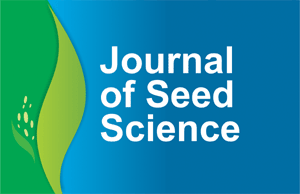The goal of storage is to maintain the characteristics that seeds have immediately after processing; however, when this is over longer periods, storage may cause loss in quality. The aim of this study was to evaluate the effect of treatment with insecticide and fungicide on corn seeds harvested in kernel form and in the ear over the time of storage in two environments for 360 days. The seeds were subjected to the following treatments: T1 - control; T2 - Deltamethrin + Pirimiphos-methyl + Fludioxonil; T3 - Deltamethrin + Pirimiphos-methyl + Fludioxonil + Thiamethoxam; T4 - Thiamethoxam, and T5 - Fenitrothion. They were then placed in paper bags and stored in two environments, in a cold room with an average temperature of 16 ºC and RH of 60% and in a non-controlled environment (an average room temperature of 25 ºC and RH of 70%) located in the municipality of Pelotas, RS, Brazil. Every four months (0, 120, 240 and 360 days), seed germination and vigor was evaluated by the first count of germination test and cold test. Reduction in germination and vigor of corn seeds, conditioned by the insecticides and fungicide used in the seed treatment, vary according to the product and the time over which the seeds remain stored. The seeds harvested in the ear show lower loss of physiological quality than those harvested in kernel form.
Zea mays L.; germination; vigor; seed treatment
